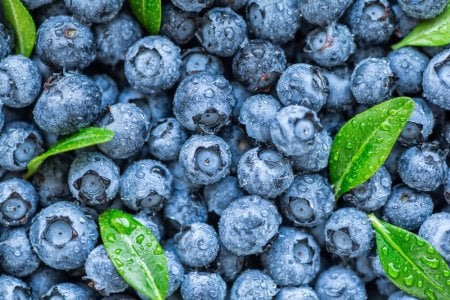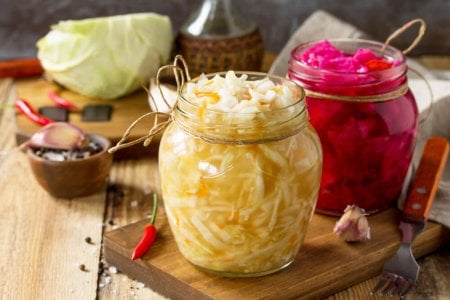Expert reveals the BEST FOODS to eat when you're stressed – ‘I literally wanted to eat radishes cooked in butter’
- Replies 1
When bad things happen, it’s normal to feel sad and stressed. But, some people feel sad and stressed for weeks or even months at a time and this prolonged stress can cause a lot of problems, like having trouble sleeping or eating.
Registered dietitian Jess Cording, was recently interviewed about her new book, The Farewell Tour: A Caregiver's Guide to Stress Management, Sane Nutrition, and Better Sleep, which is all about dealing with terminal illnesses.
She spoke about her experience with stress and eating when her father was diagnosed with pancreatic cancer. She talks about one of the foods she felt the most comfortable eating when she was in a stressed state. ‘For some reason, one of the foods I really wanted to eat all the time was radishes cooked in butter, it was the most random thing.’
According to Cording, craving high-fat, high-energy foods when stressed is a common physiological response for people who are facing overwhelming hardship. Our bodies naturally crave the nutrients that can keep us going when we face stressful situations and even when our bodies are processing grief.
It was a very thought-provoking read, which tackles everything from nutrition for stress to how to use exercise to cope. ‘Having a balance of protein, fat, and complex carbohydrates spread throughout the day, limiting sugar and energy crashes… those things were huge for me,’ she said.
Cording said that in terms of specific foods, though, she has a few standouts:
Berries
‘I really got into frozen berries.’
Fruits and vegetables that are rich in antioxidants – such as berries – can help our bodies and brains deal with stress.
A clinical trial that was published in 2017 found that the flavonoids (a group of polyphenols) in wild blueberries were associated with improved positive mood – both kids and adults reported a brighter mood two hours after intake.
Additionally, berries are also chock-full of vitamin C, which can help balance cortisol levels. Specifically, research has found that adrenal glands have high concentrations of vitamin C, and eating these foods can feed the adrenal glands and keep cortisol levels balanced.
As for eating them fresh or frozen, according to Cording, it doesn’t really matter. The only reason she opted for frozen berries, was because they were easier to store that way.
Omega-3s
Another macronutrient that is well-known to boost brain function is Omega-3 – a type of fat that is often found in seafood. Chronic stress can slow down the production of new brain cells, but omega-3 can help the brain create new cells to protect against this
Did you know that consuming enough omega-3 fatty acids can help stimulate your vagus nerve (which, in turn, helps you handle stressors better)? That’s right! According to one 2011 study, omega-3s were found to help increase vagal tone and support a healthy parasympathetic nervous response by playing a key role in regulating heart rate variability (HRV).
It’s no wonder that when Cording was dealing with significant stress that some of the specific foods she was craving were sardines packed in olive oil. According to Cording, she couldn't stop eating them. She went on to explain that ‘sardines are an excellent source of vitamin B12, minerals, and calcium if you choose to eat the bones. Those omega-3s are so soothing to our nervous systems, and olive oil, also, has so many antioxidants and healthy fats’.
Fermented foods
Any gut-healthy food is also simultaneously brain-healthy, thanks to the gut-brain connection or gut-brain axis. If you’ve never heard of this connection, according to research, there is a correlation between our digestive health and our mental well-being. An imbalance in the gut microbiome has been directly linked to mental conditions such as anxiety, depression and post-traumatic stress disorder (PTSD).
To care for both, Cording favours ‘a lot of fermented foods and prebiotic-rich foods’.
Fermented foods such as sauerkraut, kefir, and kimchi contain probiotics and prebiotic fibre, which can improve digestive health and help your body respond to stress.
We all know when we face an emotional or physical stress that our bodies crave certain nutrients and it turns out, it’s actually important for us to honour our cravings. Cording even says, if you’d like to indulge in a decadent treat every once and while, be sure to do exactly that! However, she also recommends getting curious about those cravings, ‘I do encourage thinking about what specifically about that food is appealing,’ she says. ‘Is it a texture, is it a flavour, or is there a nutrient in there that you really need? That can give you some clues for healthier versions you might consider having to satisfy that craving.’
So what did you think of this information, members? I found all of this so interesting, and as someone who is a self proclaimed ‘stress head’ I will certainly be increasing my consumption of berries, omega 3s and fermented foods! Will you?
Registered dietitian Jess Cording, was recently interviewed about her new book, The Farewell Tour: A Caregiver's Guide to Stress Management, Sane Nutrition, and Better Sleep, which is all about dealing with terminal illnesses.
She spoke about her experience with stress and eating when her father was diagnosed with pancreatic cancer. She talks about one of the foods she felt the most comfortable eating when she was in a stressed state. ‘For some reason, one of the foods I really wanted to eat all the time was radishes cooked in butter, it was the most random thing.’
According to Cording, craving high-fat, high-energy foods when stressed is a common physiological response for people who are facing overwhelming hardship. Our bodies naturally crave the nutrients that can keep us going when we face stressful situations and even when our bodies are processing grief.
It was a very thought-provoking read, which tackles everything from nutrition for stress to how to use exercise to cope. ‘Having a balance of protein, fat, and complex carbohydrates spread throughout the day, limiting sugar and energy crashes… those things were huge for me,’ she said.
Cording said that in terms of specific foods, though, she has a few standouts:
Berries
‘I really got into frozen berries.’
Fruits and vegetables that are rich in antioxidants – such as berries – can help our bodies and brains deal with stress.
A clinical trial that was published in 2017 found that the flavonoids (a group of polyphenols) in wild blueberries were associated with improved positive mood – both kids and adults reported a brighter mood two hours after intake.
Additionally, berries are also chock-full of vitamin C, which can help balance cortisol levels. Specifically, research has found that adrenal glands have high concentrations of vitamin C, and eating these foods can feed the adrenal glands and keep cortisol levels balanced.
As for eating them fresh or frozen, according to Cording, it doesn’t really matter. The only reason she opted for frozen berries, was because they were easier to store that way.
Omega-3s
Another macronutrient that is well-known to boost brain function is Omega-3 – a type of fat that is often found in seafood. Chronic stress can slow down the production of new brain cells, but omega-3 can help the brain create new cells to protect against this
Did you know that consuming enough omega-3 fatty acids can help stimulate your vagus nerve (which, in turn, helps you handle stressors better)? That’s right! According to one 2011 study, omega-3s were found to help increase vagal tone and support a healthy parasympathetic nervous response by playing a key role in regulating heart rate variability (HRV).
It’s no wonder that when Cording was dealing with significant stress that some of the specific foods she was craving were sardines packed in olive oil. According to Cording, she couldn't stop eating them. She went on to explain that ‘sardines are an excellent source of vitamin B12, minerals, and calcium if you choose to eat the bones. Those omega-3s are so soothing to our nervous systems, and olive oil, also, has so many antioxidants and healthy fats’.
Fermented foods
Any gut-healthy food is also simultaneously brain-healthy, thanks to the gut-brain connection or gut-brain axis. If you’ve never heard of this connection, according to research, there is a correlation between our digestive health and our mental well-being. An imbalance in the gut microbiome has been directly linked to mental conditions such as anxiety, depression and post-traumatic stress disorder (PTSD).
To care for both, Cording favours ‘a lot of fermented foods and prebiotic-rich foods’.
Fermented foods such as sauerkraut, kefir, and kimchi contain probiotics and prebiotic fibre, which can improve digestive health and help your body respond to stress.
We all know when we face an emotional or physical stress that our bodies crave certain nutrients and it turns out, it’s actually important for us to honour our cravings. Cording even says, if you’d like to indulge in a decadent treat every once and while, be sure to do exactly that! However, she also recommends getting curious about those cravings, ‘I do encourage thinking about what specifically about that food is appealing,’ she says. ‘Is it a texture, is it a flavour, or is there a nutrient in there that you really need? That can give you some clues for healthier versions you might consider having to satisfy that craving.’
So what did you think of this information, members? I found all of this so interesting, and as someone who is a self proclaimed ‘stress head’ I will certainly be increasing my consumption of berries, omega 3s and fermented foods! Will you?










